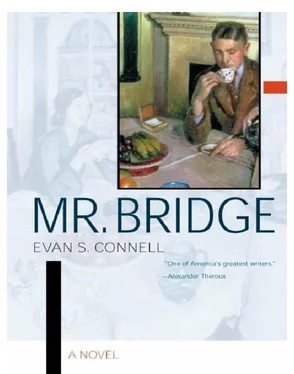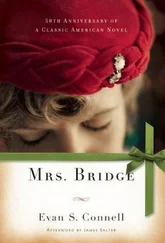“Good morning,” Mr. Bridge said without hesitation and with no change of expression. He had come into the kitchen to see if there was any French mustard, which he liked. His wife had mentioned that they were nearly out of French mustard, and he had come into the kitchen to find out for himself how much was left. He took down the tin of powdered French mustard from the spice shelf, pried off the lid with a knife, and peered inside. Then he replaced the lid, put the mustard back on the shelf, and walked out of the kitchen.
Nobody moved or spoke while he was there.
He had known for a day or so that his wife was concerned about something, and he waited. When she was ready to tell him, she would. One night she did. As they were undressing she said, “Walter, I hate to bother you, but I’m afraid I need your advice. It’s about Alice Jones.”
“Alice Jones?” he asked. “Who is Alice Jones?”
“You know. The colored child who used to be around here on weekends. The gardener’s child. Jones. That gardener who works next door. She and Carolyn were quite friendly. They’ve begun drifting apart now, but she was here last week and apparently invited Carolyn to a party. The thing is, I’m not sure I’ve done the right thing. I told Corky it wouldn’t be a good idea. I honestly didn’t know what to do. It’s been on my mind ever since. Alice is such a sweet child.”
He was inspecting his shoes to see if they needed new soles. He continued turning them over while he said, “What sort of a party?”
“I haven’t the foggiest notion. The two of them were on the porch talking, and Corky came into the sewing room to ask if she could go. I suppose I could drive her down and pick her up after the party is over. What do you think?”
“It sounds to me as though you’ve already settled the matter.”
“I feel so guilty. I wouldn’t hurt Alice’s feelings for the world.”
“Where do those people live?”
“Thirteenth and Prospect, I believe. I understand it’s a mixed area, though I’ve never been there. Do you suppose it would be safe?”
“Safe?”
“Would it be safe for Carolyn to go down there for an hour or so?”
“Yes, of course it would be safe, as long as that colored girl invited her. However, I don’t want her fooling around in that neighborhood. I have no objection to the girl visiting Carolyn here at the house when her father is working next door, but that’s the extent of it. These situations get worse, not better. I don’t want Carolyn to get in the habit of visiting that end of town.”
“I’m sure she wouldn’t make it a habit. This was a special occasion.”
“It makes no difference. Carolyn doesn’t belong at Thirteenth and Prospect any more than you or I do. Those people resent us.”
In July of that year a weekly news magazine printed a photograph of a lynching. The Negro was chained to a tree. He was naked to the waist and his back was crisscrossed with the marks of a lash. Around him stood a crowd of whites. Mrs. Bridge, when she saw this picture, was stunned; she carried the magazine to her husband and inquired in a faint, bewildered voice: “What on earth makes people behave that way?”
The picture irritated him because its publication was unnecessary, but he concealed his reaction. He studied the contorted body and the glistening black face. Then he examined the crowd. There appeared to be at least fifty men — mostly farmers, to judge from the overalls — armed with clubs and guns, and quite a number of boys. Most of the men were grinning. Several of the boys had struck comic poses for the camera. The photograph evoked a sense of the South: he could nearly feel the oppressive heat and hear the hoots of laughter and the jokes and shouts and lewd suggestions as the lash went whistling through the air and exploded against the Negro’s skin, the cheers and the clapping, the barking dogs, and the guns popping wildly in the pine forest.
Suddenly he remembered that his wife had spoken; he blinked, glanced up, and discovered her staring at him with a frightened expression.
“There are many fine people in the South,” he said. “What did this fellow do?” He placed his index finger on the Negro’s head. “Tell me, what was this fellow doing that he shouldn’t have been doing? I have spent a certain amount of time in the South. I once spent several days in Atlanta and I never met more courteous people.”
That was the summer a group of neighborhood boys dug a cave in one of the vacant lots. Douglas was not allowed to dig, presumably because he was too young to be granted such a privilege, but after the cave was finished he was sometimes permitted inside. Mr. Bridge did not altogether like this, and one Sunday he decided to have a look at the cave. He thought he could locate the entrance, because Douglas had described how it was camouflaged.
As he was walking along the street toward the vacant lot he began thinking about his own boyhood. He remembered how important it had been to have a cave, or a platform in the fork of a tree, or a shack to use as a clubhouse, and how necessary it was to keep the entrance hidden or locked. More time had been spent on locks and burglar alarms than on anything else. He had not thought of these things for a long time, and they began to bring back other memories. He remembered the farm near Joplin where he often went to visit his cousin Reed, and the odor of apples moldering in the orchard, the dried grapevine they tried to smoke, the dying fox they found one evening on the riverbank, the plump and stupid hired girl whose name was Lizzie or Tillie — so many years had passed that he was no longer sure of her name. The nipples of her breasts stood up like raisins beneath her dress. And he could see again his aunt and uncle seated side by side on the swing, gliding calmly to and fro, never speaking, never moving, while bats and barn swallows darted after insects in the summer twilight. Now and then an automobile could be seen bouncing along the dirt road to town, and the ragged sputtering of the motor carried clearly across the silent fields. All of this came back to Mr. Bridge like the unforgotten taste of hard green apples. A generation had passed. Not ten years, or fifteen years. A complete generation. The old folks were gone. Uncle Senn with his drooping frontier mustache. Aunt Christine with her ivory locket and blue-veined hands. Reed owned the farm now and had four sons, three of them older than Douglas.
The cave was not easy to find. He pushed through the weeds and was wondering if he had gotten into the wrong lot, when suddenly he heard voices underground. He stopped and looked around, because the entrance must be very close, but he could not see it. Then he found the dead bush and beneath it the outline of a sod-covered door. He had planned to tramp back and forth on top of the cave, but now because it was occupied he thought he should not.
The bush quivered, the trap door tilted, and the startled face of Rodney Vandermeer appeared among the weeds. Just as quickly he disappeared under the bush. There was more subterranean conversation. Silence. Once again the trap door opened. This time it was Douglas.
“Hello there,” said Mr. Bridge.
“Hello,” Douglas said.
“I’ve been wondering how substantial this thing is. I didn’t want the roof falling in on you.”
“It won’t fall in.”
“Ah? What makes you so sure?”
“Some of the guys ran a wheelbarrow full of bricks over it.”
“I see. Well, these things can be dangerous if you don’t watch out. Have I disturbed you?”
“Oh,” Douglas said, “I guess not. We knew somebody was up there.”
Читать дальше












